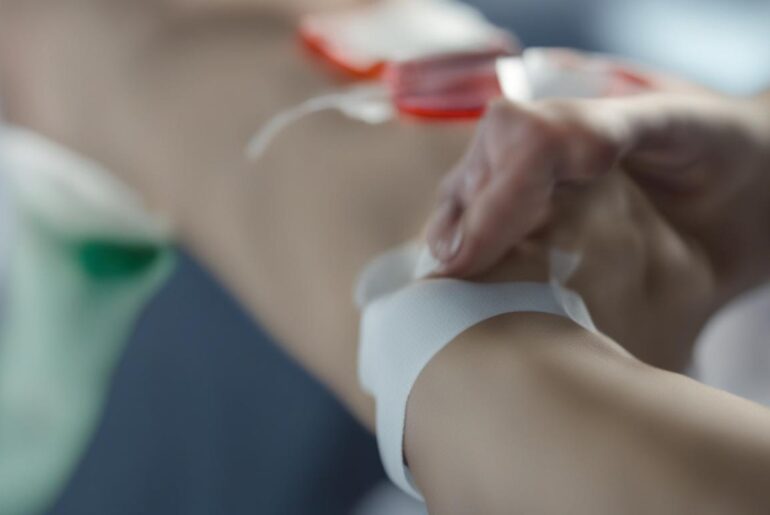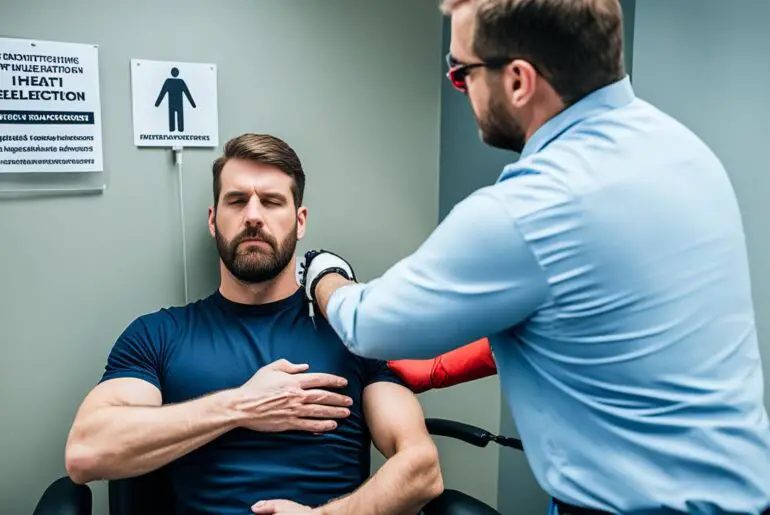Did you know that some individuals may experience allergic reactions to HCG injections? These allergic reactions can manifest as skin rashes, itching, hives, and even swelling of the face, lips, or tongue. It is crucial to be aware of the signs of HCG injection allergies to ensure safer use.
Allergic reactions to HCG injections can have serious implications, and it is important to recognize the symptoms to prevent further complications. As HCG (Human Chorionic Gonadotropin) is commonly used in fertility treatments and hormone therapy, understanding the signs of HCG allergy becomes essential for both men and women.
Key Takeaways:
- Some individuals may experience allergic reactions to HCG injections.
- Allergic reactions can manifest as skin rashes, itching, hives, and swelling of the face, lips, or tongue.
- Recognizing the signs of HCG injection allergies is crucial to ensure safer use.
- Seek medical attention promptly if you suspect an allergic reaction to HCG injections.
- Proper communication with your healthcare provider is essential for safe and effective HCG injection use.
What is HCG and its Uses
HCG stands for Human Chorionic Gonadotropin, a hormone that serves various purposes in both men and women.
In women, HCG is commonly prescribed in conjunction with other fertility drugs to enhance the chances of pregnancy.
For men and adolescent boys, HCG plays a crucial role in stimulating testosterone and sperm production.
Moreover, HCG is utilized in the treatment of male children with cryptorchidism, a birth defect impacting the testes.
It’s important to note that healthcare professionals may prescribe HCG for off-label uses based on individual circumstances.
Precautions and Considerations
Before using HCG injections, it is important to inform your healthcare provider about any existing medical conditions or allergies. This includes conditions such as asthma, cyst on the ovary, heart disease, migraine, kidney disease, ovarian cancer, prostate cancer, seizures, and any known allergies to HCG or other substances.
HCG injections should not be used during pregnancy, and it is important to discuss any plans for pregnancy or breastfeeding with your healthcare provider. It is crucial to provide a comprehensive medical history to ensure the safe and appropriate use of HCG injections.
| Medical Conditions | Information |
|---|---|
| Asthma | Inform your healthcare provider if you have asthma. |
| Cyst on the Ovary | Discuss any cysts on the ovary with your healthcare provider before using HCG injections. |
| Heart Disease | Inform your healthcare provider if you have any heart disease. |
| Migraine | Discuss any history of migraines with your healthcare provider before using HCG injections. |
| Kidney Disease | Inform your healthcare provider if you have kidney disease. |
| Ovarian Cancer | Discuss any history of ovarian cancer with your healthcare provider. |
| Prostate Cancer | Inform your healthcare provider if you have prostate cancer. |
| Seizures | Discuss any history of seizures with your healthcare provider before using HCG injections. |
Note: It is important to consult with a healthcare provider and provide a comprehensive medical history to ensure the safe use of HCG injections.
Proper Usage of HCG Injections
Administering HCG injections correctly is crucial for optimal results and safety. The injection method, preparation, dosage, and disposal of sharps should be followed as instructed by your healthcare provider. Here’s a comprehensive guide to ensure proper usage:
Injection Method
HCG injections can be administered either into a muscle or under the skin, depending on your healthcare provider’s recommendation. The appropriate injection method will be determined based on factors such as the specific HCG formulation and your individual needs.
Preparation
Proper preparation ensures a hygienic and safe injection process. Your healthcare team will teach you the necessary techniques to prepare the injection site and the HCG medication itself. This may include cleaning the injection area and ensuring that the HCG solution is properly mixed if required.
Dosage
It is vital to adhere to the prescribed dosage and timing indicated on the prescription label. Your healthcare provider will determine the appropriate dosage based on your specific needs and medical condition. Deviating from the prescribed dosage can affect the effectiveness and safety of the treatment.
Sharps Container
Used needles, syringes, and any other sharps used for HCG injections should be disposed of properly in a sharps container. This prevents accidental injuries and ensures the safe disposal of medical waste. Your healthcare provider or local authorities can guide you on the proper disposal methods and collection sites in your area.
Missed Dose
If you miss a dose of HCG, it is important to contact your healthcare provider for guidance. They can provide instructions on how to proceed and whether any adjustments need to be made to your treatment schedule. Consistency in adhering to the prescribed regimen is crucial, especially for individuals undergoing fertility treatment, to maximize the chances of success.
Fertility Treatment
For individuals undergoing fertility treatment, it is essential to strictly follow the prescribed regimen. Missing doses or deviating from the prescribed schedule can impact the effectiveness of the treatment. Any concerns or missed doses should be promptly addressed with your healthcare provider to ensure optimal outcomes.
Proper usage of HCG injections plays a pivotal role in the success and safety of the treatment. Adhering to the recommended injection method, dosage, disposal methods, and promptly addressing any missed doses are key steps to achieve the desired results in your HCG therapy.
Potential Interactions with HCG Injections

When using HCG injections, it’s important to be aware of potential interactions with herbal and dietary supplements. Informing your healthcare provider about all the supplements and medications you are currently taking, including non-prescription drugs, is crucial to ensure the safety and effectiveness of HCG injections. Some supplements and medications can interact with HCG injections, and your healthcare provider will be able to provide guidance on potential drug interactions.
Here is a list of common herbal supplements and dietary supplements that may interact with HCG injections:
| Herbal Supplements | Dietary Supplements |
|---|---|
| St. John’s Wort | Calcium |
| Ginkgo Biloba | Iron |
| Echinacea | Omega-3 Fatty Acids |
| Ginseng | Vitamin D |
| Valerian Root | Probiotics |
It’s important to note that this is not an exhaustive list, and there may be other supplements that can interact with HCG injections. Always consult with your healthcare provider before starting any new supplement or medication to ensure the safety and efficacy of your HCG treatment.
Please consult your healthcare provider for personalized advice on potential interactions between HCG injections and specific supplements or medications you may be taking.
Monitoring and Observation during HCG Injection Use
Regular monitoring and observation play a crucial role in the safe and effective use of HCG injections. Whether you are undergoing fertility treatment or using HCG injections for other purposes, close monitoring is essential to ensure optimal results and identify any potential complications.
For men and boys, it is important to closely observe and report any noticeable effects to your healthcare provider. This helps them assess the effectiveness of the treatment and make any necessary adjustments to the dosage or frequency of injections.
In the case of fertility treatment, monitoring involves various methods such as urine samples, blood tests, and ultrasounds. These tests allow healthcare professionals to track your progress and ensure that the HCG injections are enhancing your chances of successful conception.
If you suspect a pregnancy or experience any unusual symptoms during the use of HCG injections, it is crucial to contact your healthcare provider immediately. They can evaluate your condition and provide appropriate guidance or further medical intervention as needed.
| Monitoring Methods | Purpose |
|---|---|
| Urine samples | To detect the presence of HCG hormone and confirm pregnancy |
| Blood tests | To measure the levels of HCG hormone in the bloodstream and monitor the progress of treatment |
| Ultrasounds | To observe the development of follicles, eggs, or embryos and assess the response to HCG injections |
By closely monitoring and observing the effects of HCG injections, healthcare providers can ensure that the treatment is on track and make any necessary adjustments to optimize your chances of success. Remember, open communication with your healthcare provider is essential throughout the treatment process.
Common Side Effects of HCG Injections
Like any medication, HCG injections may cause side effects. It is important to be aware of these potential effects to ensure your safety and well-being. Common side effects of HCG injections include:
- Skin rash
- Itching
- Hives
- Swelling of the face, lips, or tongue
- Breathing problems
- Breast enlargement
- Nausea
- Vomiting
- Pelvic pain
- Bloating
- Sudden weight gain
- Changes in urinary patterns
It is important to note that these side effects may vary in severity from person to person. While some individuals may experience only mild discomfort, others may have more severe reactions. If you notice any of these side effects or any other unusual symptoms after receiving HCG injections, it is crucial to report them to your healthcare provider for further evaluation and guidance.
Less Common Side Effects of HCG Injections

While HCG injections are generally well-tolerated, it is important to be aware of potential side effects that may occur in some individuals. These side effects are considered less common and may not require immediate medical attention. However, if they persist or become bothersome, it is crucial to report them to your healthcare provider for further evaluation and guidance.
Acne
One of the less common side effects of HCG injections is the development of acne. Some individuals may experience an increase in breakouts or the formation of new pimples. It is recommended to maintain a good skincare routine and consult a dermatologist if the acne becomes severe or persistent.
Emotional Changes
HCG injections can sometimes cause emotional changes in individuals. This may include mood swings, irritability, or increased sensitivity. It is important to be aware of these potential changes and communicate them with your healthcare provider.
Facial Hair Growth
In some cases, HCG injections may stimulate facial hair growth in both men and women. This side effect is more common in individuals who are already genetically predisposed to facial hair growth. If this side effect becomes a concern, discussing possible alternatives with your healthcare provider is recommended.
Headache
A headache is another possible side effect of HCG injections. This can range from mild to moderate and may be managed with over-the-counter pain relievers unless otherwise directed by your healthcare provider.
Injection Site Reactions
Pain or irritation at the injection site is a common side effect of injections, including HCG injections. This can manifest as redness, swelling, or tenderness. If these reactions persist or worsen, it is important to inform your healthcare provider.
Tiredness
Feeling tired or experiencing fatigue is another potential side effect of HCG injections. This may be temporary and resolve over time as your body adjusts to the medication. It is advisable to get enough rest and consult your healthcare provider if the tiredness becomes severe or persistent.
Upset Stomach
HCG injections can sometimes cause gastrointestinal discomfort, leading to upset stomach or nausea. This side effect can usually be managed with dietary adjustments, such as eating smaller meals or avoiding trigger foods. If the upset stomach persists or worsens, consulting your healthcare provider is recommended.
Proper Storage and Disposal of HCG Injections
Proper storage and disposal of HCG injections are essential for maintaining their efficacy and ensuring safety. Follow the guidelines provided by your pharmacist or healthcare provider to store HCG injections correctly. This will help preserve their potency and prevent any unwanted effects.
When it comes to storage:
- Keep HCG injections in their original packaging to protect them from light and moisture.
- Store HCG injections at the recommended temperature, typically between 36°F and 46°F (2°C and 8°C).
- Avoid freezing HCG injections, as extreme temperatures can affect their effectiveness.
Remember to check the expiration date on the packaging before using HCG injections. Expired medication may not be as potent or safe to use. If the expiration date has passed, dispose of the unused medication properly to avoid any potential harm.
When it comes to disposal:
- Used needles and syringes should never be thrown in the regular trash or recycling bin.
- Properly dispose of used needles and syringes in a sharps container to prevent accidental injury. Sharps containers are specifically designed for safe disposal of sharp objects.
- Contact your local pharmacy or healthcare provider for information on how to safely dispose of sharps containers in your area.
By following the correct storage and disposal procedures, you can ensure the effectiveness and safety of HCG injections. If you have any questions or concerns about storage or disposal, consult your pharmacist or healthcare provider for guidance.
Conclusion
Allergic reactions to HCG injections can be a concern for individuals using this hormone treatment. It is crucial to stay vigilant and watch out for signs and symptoms of an allergic reaction. Common indicators include skin rashes, itching, hives, swelling, and breathing difficulties. If you experience any of these symptoms, it is important to seek immediate medical attention for appropriate evaluation and treatment.
To minimize the risk of HCG injection allergies, it is essential to follow proper usage practices. This includes adhering to the prescribed dosage, storing the medication correctly, and disposing of unused needles and syringes in a sharps container. Open communication with your healthcare provider is crucial to ensure safety and to address any concerns or questions you may have.
Remember, prevention is key. By being aware of the signs of allergic reactions to HCG injections and taking the necessary precautions, such as discussing your medical history and any known allergies with your healthcare provider, you can enhance your safety during treatment. Your healthcare provider is your best resource for guidance and support throughout your HCG injection journey.
FAQ
What are the signs of allergic reactions to HCG injections?
Allergic reactions to HCG injections may manifest as skin rashes, itching, hives, swelling of the face, lips, or tongue, breathing difficulties, and other symptoms.
What is HCG and how is it used?
HCG stands for Human Chorionic Gonadotropin, and it is used in women to increase the chances of pregnancy when combined with other fertility drugs. In men and boys, HCG helps stimulate testosterone and sperm production. HCG is also used in male children with cryptorchidism, a birth defect affecting the testes.
What precautions should I take before using HCG injections?
Before using HCG injections, it is important to inform your healthcare provider about any existing medical conditions or allergies. This includes conditions such as asthma, ovarian cysts, heart disease, migraines, kidney disease, ovarian or prostate cancer, seizures, and any known allergies to HCG or other substances. HCG injections should not be used during pregnancy, and it is important to discuss any plans for pregnancy or breastfeeding with your healthcare provider.
How should I properly use HCG injections?
HCG injections can be administered either into a muscle or under the skin, and the appropriate injection method should be determined by your healthcare provider. Proper preparation and administration techniques will be taught to you by your healthcare team. It is essential to follow the prescribed dosage and timing as indicated on the prescription label. Used needles and syringes should be disposed of in a sharps container to ensure safety.
Are there any potential interactions with HCG injections?
HCG injections may interact with certain herbal and dietary supplements. It is important to inform your healthcare provider about any supplements or medications you are currently taking, including non-prescription drugs. Your healthcare provider can provide guidance on potential drug interactions to ensure the safety and effectiveness of HCG injections.
What monitoring and observation is necessary during HCG injection use?
Regular monitoring and observation are essential during the use of HCG injections. For men and boys, close monitoring is necessary, and any noticeable effects should be reported to the doctor. For individuals undergoing fertility treatment, monitoring can involve urine samples, blood tests, and ultrasound exams to track progress and ensure the effectiveness of the treatment.
What are the common side effects of HCG injections?
Common side effects of HCG injections may include allergic reactions such as skin rash, itching, hives, swelling, and breathing problems. Other common side effects include breast enlargement, nausea, vomiting, pelvic pain, bloating, sudden weight gain, and changes in urinary patterns.
Are there any less common side effects of HCG injections?
Less common side effects of HCG injections may include acne, emotional changes, facial hair growth, headache, pain or irritation at the injection site, tiredness, and upset stomach. While these side effects may not require immediate medical attention, it is important to report them to your healthcare provider if they persist or become bothersome.
How should I store and dispose of HCG injections?
HCG injections should be stored properly to maintain their efficacy. It is important to follow the specific storage instructions provided by your pharmacist or healthcare provider. Unused medication should be disposed of appropriately after the expiration date has passed. Used needles and syringes should be disposed of in a sharps container to prevent accidental injuries.
What should I do if I suspect an allergic reaction to HCG injections?
If you suspect an allergic reaction to HCG injections, it is crucial to seek medical attention promptly to prevent any further complications. Contact your healthcare provider for appropriate evaluation and treatment.




